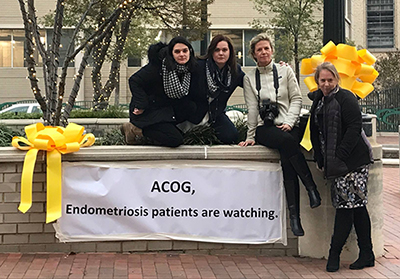By Casey Berna, LICSW
 Endometriosis is a disease that impacts 1 in 10 women. Endometriosis can take 7-10 years to get diagnosed due to a striking lack of information regarding the disease in both the medical community and society at large. 40% of all women struggling with infertility struggle with endometriosis, since it can cause inflammation that can impact egg quality, fertilization, and implantation. Endometriosis and resulting adhesions can also cause anatomical distortion, which can impede reproduction. There are currently no diagnostic tools available that can diagnose or rule out endometriosis. Sometimes larger nodules throughout the pelvis or endometriomas, which are specialized cysts that usually are indicative of more widespread disease throughout the pelvis, can be visualized on scans. The vast majority of endometriosis can only be diagnosed through a laparoscopic surgery and confirmed through a biopsy.
Endometriosis is a disease that impacts 1 in 10 women. Endometriosis can take 7-10 years to get diagnosed due to a striking lack of information regarding the disease in both the medical community and society at large. 40% of all women struggling with infertility struggle with endometriosis, since it can cause inflammation that can impact egg quality, fertilization, and implantation. Endometriosis and resulting adhesions can also cause anatomical distortion, which can impede reproduction. There are currently no diagnostic tools available that can diagnose or rule out endometriosis. Sometimes larger nodules throughout the pelvis or endometriomas, which are specialized cysts that usually are indicative of more widespread disease throughout the pelvis, can be visualized on scans. The vast majority of endometriosis can only be diagnosed through a laparoscopic surgery and confirmed through a biopsy.
Members of the endometriosis community, supported by many endometriosis professionals and non-profits, started a petition imploring the American Congress of Obstetricians and Gynecologists (ACOG) to improve standards of care for endometriosis patients. Unfortunately, the lack of awareness throughout the entire medical community, as well as the current treatments and policies held by the medical organizations in power, contribute to the delay in diagnosis and obstruction of care that patients need. While some patients with endometriosis are asymptomatic and may only learn about their disease after struggling with infertility, many patients suffer immensely for decades with disease impacting many organs throughout their body causing symptoms such as period pain, pain with intercourse, pain with ovulation, back pain, leg pain, diarrhea, constipation, urinary issues, and fatigue. The endometriosis community is fighting the established medical community for better education for their members so that endometriosis is realized and treated sooner. We are also fighting to foster a culture of referral among practitioners so that patients with symptoms of invasive disease are immediately referred to specialized surgeons who through meticulous surgery can help patients improve fertility and achieve a greater quality of life. Patients are also fighting for access to and referral to multidisciplinary care providers, as endometriosis is an invasive and devastating disease that requires a lot of support.
For far too long, endometriosis patients have endured years of physical and emotional suffering without the institutional support required to meet their healthcare needs. So many patients have endured multiple ineffective surgeries by practitioners who were not trained to surgically treat such a pervasive and invasive disease that impacts so many systems in the body. So many patients have been told to have hysterectomies to be rid of their disease, only to find that their endometriosis pain still exists within their pelvis as a hysterectomy is not a cure. Pregnancy, which can be difficult to achieve for many with the disease, is also not a cure or a treatment for the disease, despite many practitioners saying otherwise. So many endometriosis patients that struggle with infertility must endure the deeply painful physical and emotional challenges at the intersection of where the two devastating diseases meet, often in silence and without recognition of or support for the hardships they are facing. The endometriosis community will continue to petition the ACOG, organize and speak our truths until real change is made as our lives, our fertility, our reproductive choices, and those of future patients depend on it.
Casey Berna is a social worker who dedicates her days to advocating for, educating and supporting fellow infertility and endometriosis patients. March is Endometriosis Awareness Month. Casey will be one of the speakers at the Second Annual New England Endometriosis March on Saturday morning, March 24th at the Boston Common in Boston Common, MA. Register today!
